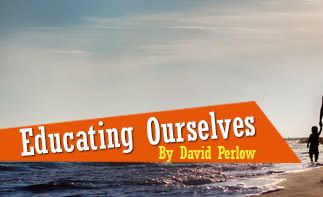
Love at One Glance
The son of the Rosh Yeshiva felt unloved and unwanted; unlike his brilliant and studious older brothers, he simply did not have the patience to sit and learn all day long...

Rabbi Stern is a top Rosh Yeshiva (head of a yeshiva). He has been immersed in learning Torah all of his life and it is his greatest pleasure. The Rabbi has 10 sons, and nine of them are pretty much like him – they like to learn Torah night and day.
So which son do you think brought the Rabbi to my door? You guessed it. It was the “black sheep” of the family. It was the son who was not able to sit and learn Torah 24/7. We need people who can learn because they are the pillars of our world. But this tenth son simply couldn’t immerse himself totally in the Torah all of the time. Any time he tried to speak to his father or to his brothers about anything that wasn’t directly related to learning, they made it very clear that they didn’t want to be wasting their time listening to  his “nonsense.”
his “nonsense.”
That’s when it started to get very difficult for everyone in the family. The learners simply couldn’t understand why this brother wasn’t like them, or that it was really okay for him to be different. I was asked to talk to the son, to see what could be done. Before I agreed, though, I stipulated that I would only agree to a session with the son, if the father would also attend. He agreed, and we got to work.
It turned out that Rabbi Stern had grown up in a home where his father was a successful businessman. Mr. Stern wanted his son to follow in his footsteps, and to also join him in the family business, but his son didn’t want that – he only wanted a life of learning. They argued about it, but ultimately, the son stuck to his guns and stayed in the yeshiva, and to be frank, that’s really where he belongs.
Ironically, now that the Rabbi is the head of a successful yeshiva, he has much less time to learn than before. He has a lot responsibilities to do now, like raising money for his institution, and trying to balance the budget. Every year, he has to raise at least a million dollars to help pay for the yeshiva dorms, and the books, and the electricity, and the staff.
Rabbi Stern is discovering as he goes along, that he increasingly needs to develop certain skills to manage the yeshiva efficiently, let’s call them “business skills.” There’s no question that he’s very good at his job, but again – and this is really the key point – even a Rabbi on his level who is completely immersed in the Torah world, is finding that he can’t just sit and learn Torah all day. He also needs to make connections, and to raise money, and to manage staff issues and other things.
So this famous Rabbi is sitting in front of me, together with his son, who can’t learn all day and we’re trying to help them find their common ground. The son is still Torah observant; he does many good deeds, and he’s helping people, and spending his time volunteering for humanitarian organizations. He is really trying to help people. He only learns an hour a day but he enjoys that hour. Now and he desperately wants his father to recognize that his way of life is also important, and also has value.
But the father is still struggling to relate.
Before I met with Rabbi Stern, lots of other therapists, Rabbis, and advisors had already explained to him that he needs to let go of what he wants and to accept his son for who he really is. The Rabbi knows this intellectually – but he still can’t change the way he relates to his son. As a result, the son is growing up in his home feeling like a second class citizen. The son feels that his dad doesn’t love him as much, or in the same way, as he loves his Torah-learning siblings. The son feels like his father doesn’t get any nachas, or joy, from the good deeds that he’s doing that aren’t directly related to Torah learning, and that he’s an embarrassment to him.
What’s going to turn this situation around? The courage to believe! And particularly, courage from the Rosh Yeshiva to recognize that he’s missing something in his own life and that G-d is sending this son to him to activate it. But Rabbi Stern looks at his son, who enjoys singing, and talking with people, and doesn’t spend all day learning Talmud – and he can’t accept that he himself has anything to change. I had no doubt that G-d wanted him to loosen up a little, and to develop an ability to speak about things that aren’t strictly Torah. Maybe, he wants the Rabbi to have more joy from his life when he’s not learning, and to appreciate all the other tremendous blessings and kindnesses G-d is doing for him?
In the meantime, there’s a disconnection between the father and son, and they are finding it very hard to overcome it, or even to discuss it properly. The Rabbi is an auditory / visual person, while his son is a feeler, and they are struggling to find a way to communicate with each other. I saw that they needed to reach a common ground that transcends style and words. Words often don’t work when you’re dealing with an intellectual person on the one hand, and a “feeler” on the other.
I asked Rabbi Stern and his son to sit down opposite one another, and to simply look in each other’s eyes for as long as they can, so they can see what’s really going on, behind all the words and hurt. The eyes are the mirror of the soul – the eyes never lie.
When that boy looks into his father’s face, he sees clearly that his father does love him, and truly wants him to be happy. I saw the love shining right out of the Rabbi’s face! Within seconds both father and son were in a tearful embrace. Once that fundamental issue had been resolved, wordlessly, it became possible for father and son to bond with each other, and to recognize that the other one is very valuable, even though they are so different. Now they can learn to give to each other, and to see what it is they need to complete in themselves. As the session came to an end, the thought started to dawn on the Rosh Yeshiva that by following this courageous approach, he might grow more from this boy, than all his other sons combined.
I later heard, from the Rabbi’s wife, that the one session we had produced a miraculous change in her husband’s relationship to their son. They have been speaking openly with each other, and taking walks with each other and singing the son’s Breslever music together (which the Rabbi previously refused to sing) and expressing all of their mutual love for one another, that had been covered up for all those years.











Tell us what you think!
Thank you for your comment!
It will be published after approval by the Editor.